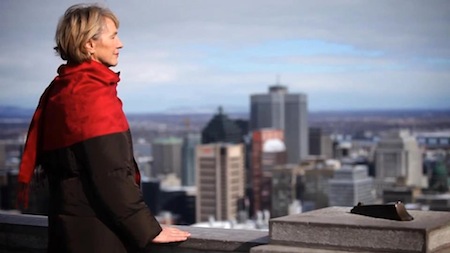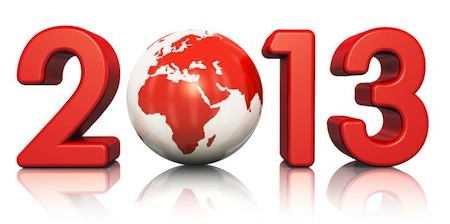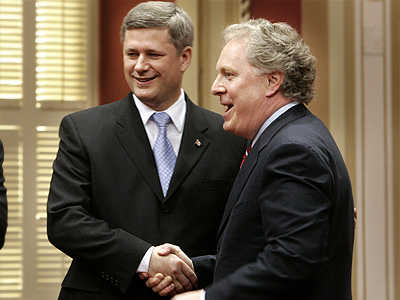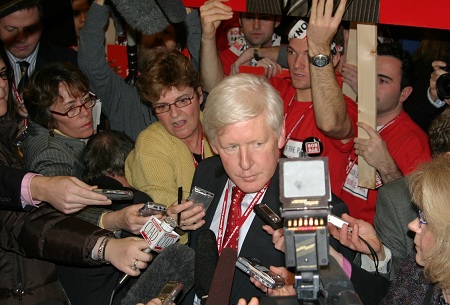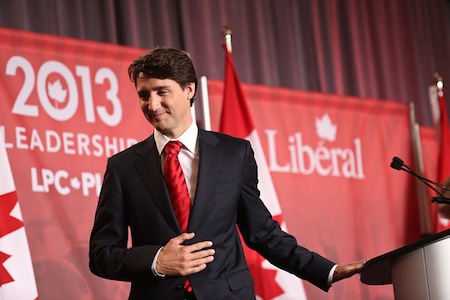
While everyone was watching to the Vatican City on Wednesday, another potential world leader took a step toward his own elevation — Justin Trudeau, whose chief rival for the Liberal Party leadership in Canada dropped out and endorsed him in advance of what’s now likely to be a mere formality on April 14. 
Like the new Pope Francis, Trudeau will assume control of a once-powerful organization that has had difficulty finding its purpose in a vastly changing world — the world of 21st century Canadian governance. He’ll do so having risen to the leadership as the son of a beloved former prime minister on a campaign that’s little more substantive than rewarmed platitudes of what’s been orthodox Liberal policy of the past two decades and his airy good looks.
Right now, Canadians love him, though — they say that they would overwhelmingly support the Trudeau-led Liberals in the next election. Today, however, with his election as leader all but certain, the Liberals remain mired in third place behind the Conservative Party and the New Democratic Party. So it’s worth taking caution in reading polls that seem to show a Trudeau landslide in the next election — those polls suggest to me the upper limit of what Trudeau might achieve in a best-case scenario in 2015, when the next federal election is likely to be held.
As the leadership race approaches, though, the central question of Canadian politics has now become whether, on the one hand, Trudeau’s rock-star quality and popularity will wear thin after his coronation (dooming the Liberals to what must certainly be oblivion) or, on the other hand, Trudeau will rise to the occasion by navigating the top echelons of federal politics sufficient to bring the Liberals back into power by following in the footsteps of his father.
The future of Canadian politics — and Canadian policy in the next decade — rests on the answer to that question.
His chief rival Marc Garneau exited the race on Wednesday after releasing a survey that showed he would win just 15% of Liberal voter support to 72% for Trudeau, who he also endorsed.
As the first Canadian in outer space, Garneau is somewhat the John Glenn of Canada — he served as the president of the Canadian Space Agency from 2001 to 2006, and then moved into electoral politics, winning a seat in the 2008 election in the Québécois riding of Westmount in the Montréal area. He’s thoughtful, articulate, and he hasn’t been unwilling to take on Trudeau — taking advantage of several debates to challenge Trudeau directly for running a campaign of ’empty words’ as an untested rookie.
Garneau, ironically, would have been a better candidate than any of the past three Liberal Party leaders — former prime minister Paul Martin, who lost the 2006 federal election to Stephen Harper’s ascendant Conservative Party; former environment minister Stéphane Dion, who won just 26% in the 2008 federal election; and former author and academic Michael Ignatieff, who won just 19% and 34 seats in the 2011 federal election, well behind the more progressive NDP that’s now Canada’s official opposition. He may well have even been a better Liberal leader than Bob Rae, who ruled out a run himself last year, despite receiving high marks for his performance as interim leader.
If Trudeau becomes prime minister in 2015, Garneau will obviously be at the top of the list to fill an important ministry.
But Trudeau fils has always been the frontrunner in the race, and it was never likely that anyone would be able to dislodge what the Liberals believe is their last shot at returning to electoral viability. Sure, six additional candidate remain in the race — including former justice minister Martin Cauchon, former leadership contender Martha Hall Findlay and British Columbia MP Joyce Murray, who has called for center-left unity with both the NDP and Canada’s Green Party.
Nonetheless, it seems ever more likely that Trudeau will now overwhelmingly win the Liberal leadership and, sure, he probably seems like the best chance that Liberals have to retake power, even if they would need to quintuple their current 35 seats in the House of Ridings in order to win a majority. We still don’t know if Trudeau’s breezy success in politics to date will continue after he wins the Liberal leadership, though even former prime minister Jean Chrétien, the last Liberal to have widespread electoral success, agrees that the race — and, implicitly, Trudeau’s energetic campaign — has boosted Liberal fortunes.
Either way, the Liberal Party in 2013 is a far cry from the Liberal Party that governed Canada for 69 years in the 20th century — a party dominated by elites from Montréal, Toronto and Ottawa — and personified by Trudeau’s father, Pierre Trudeau, prime minister in the 1970s and 1980s. Continue reading Trudeau now all but certain to become Liberal leader in Canada →
![]()
